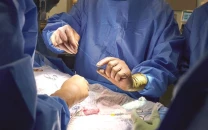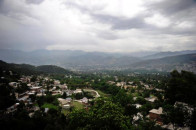Punjab govt to restart challan process to discourage cruelty to animals
Challan books will soon be distributed among SPCA officials

A Reuters file photo of a cat and a rat.
According to official sources, the process for challan and other punishments would be re-started during the current month of January. The government has directed the officials concerned to speed up the process of inspection of cruelty towards animals. Challan books will soon be distributed among officials of Society for Protection of Cruelty to Animals (SPCA), a government entity working to protect the rights of animals and birds.
SPCA Inspector Abu Suffian said that special magistrates at district level were being deputed to impose fine and other punishments on persons found involved in torturing animals. The government has directed the district sessions judges to depute special magistrates in their respective districts, he added.
Secretary Livestock Barrister Nabeel and SPCA honourary Secretary Farhat Nazeer Awan were taking special interest to discourage all sorts of cruelty to animals.
They, both, are committed to protecting the rights of animals, said Abu Suffian. About challan amount and other punishments, he said that a new draft was ready to be tabled in the assembly soon and the challan amount would be increased in near future.
Responding to a question, he said that there were over 50 types of cruelties occurring on animals including animal fights (cock, bear, dog, camel, partridge and some others), torture with sticks, putting red chilli in eyes or rectum, touching electric devices, repeatedly hitting nails during race competitions, overloading, ignoring treatment, putting many animals at a very short space at cattle markets, putting animals under seats of buses during transportation, injuring nose of animals on misconception of getting more work, ignoring thirst and feed requirements, taking much work during forbidden hours (10 am to 5pm) especially in summer season, had become common practice in South Punjab.
He added that there had been some punishments for cruelty to animals four years ago. In the past, the society for the protection of cruelty to animals was active and it managed to submit 15 to 20 challans on a daily basis with magistrate. The owners of equines did not dare to inflict torture on their animals.
The equines were mostly used for draft purposes. Keeping in view the importance of these draft animals especially in terms of labour, the incumbent administration taking some initiatives for improvement of this sector as awareness campaign is in progress and a new act is being framed by the department.
These initiatives would help to rejuvenate SPCA in an amicable way, he added. Abu Sufian said that there was Rs200 fine and six-month imprisonment in case anyone was found torturing animals, under SPCA 1890 Act. However, the fine amount will be increased in the upcoming legislation.
Talking about action on violation of SPCA act, he said the SPCA was actively engaged in creating awareness among owners of the animals.
The main objective of the society was to prevent equines from harsh treatment, he said. At present, employees of SPCA were performing duties in different parts of the province. All the staff was trained and equipped with the vaccine, deworming techniques and some other types of treatments, he said.
Replying to another question about the strength of equines in district Multan, he said that there were a total 19,489 equines during the last census, which included 1,781 horses, 16,901 donkeys, and 807 mules. Responding to question about treatment facility for equines, the SPCA official said that they had treated hundreds of animals in 2019 free of cost.
Published in The Express Tribune, January 6th, 2020.



















COMMENTS
Comments are moderated and generally will be posted if they are on-topic and not abusive.
For more information, please see our Comments FAQ